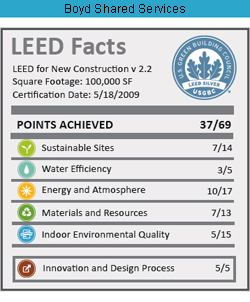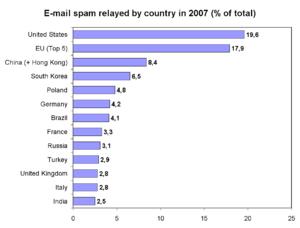LEED

Leadership in Energy and Environmental Design
What is LEED?
Jan 1st, 2010 LEED is an independent rating system, established by the US Green Building Council to score building performance using 5 major metrics: 1) Site Sustainable, 2) Water Efficiency, 3) Envelope and Energy Efficiency, 4) Materials and Resources, and 5) Indoor Environmental Quality. The LEED Scorecard below is for Boyd Gaming Laundry Services. LEED as defined by the US Green Building Council is "a voluntary, consensus-based, market driven program" that provides third-party verification of green buildings. From individual buildings and homes, to entire neighborhoods and communities, LEED is transforming the way built environments are designed, constructed, and operated. Comprehensive and flexible, LEED addresses the entire lifecycle of a building.

Why should I consider LEED®?
LEED provides a scoring method to determine whether what you are doing in the built evironment is Sustainable. The "D" is LEED stands for "Design." It means trying old ideas, like passive design for light, ventilation, and heat (how buildings were made livable before the introduction of cheap fossil fuels) and exploring new ideas using advanced technologies and methods. A lot is being said about "Sustainability" and what it means. Many people believe that "Sustainablity" and "Green" is only for the wealthy and those that can afford to enjoy healthier built environments. We find the definition below to be the best understanding of balancing three ideas: 1) Social Responsibility, 2) Environment Stewardship, and 3) Economic Prosperity.
"Sustainable Development is development that meets the needs of the present without compromising the ability of future generations to meet their own needs. It contains within it two key concepts:• The concept of 'needs', in particular the essential needs of the world's poor, to which overriding priority should be given; and
• the idea of limitations imposed by the state of technology and social organization on the environment's ability to meet present and future needs."
"Our Common Future", by World Commission on Environment and Development, 1987
The US, as one of the largest consumers, per captia of water and energy on the planet, we have the responsibility to redefine the American way of life to align with an environment leadership position.

Do we understand the problem...
Consider the adjacent chart: The US consumes 575 liters of water per person per day as compared to other parts of the world at just 10 liters per person per day.
Or consider the energy lost in 62 trillion spam emails (source: ABCnews): 62 trillion spam emails consume annually the equivalent of 2.4 million U.S. homes using electricity and the same greenhouse gas emissions as 3.1 million passenger cars consuming two billion gallons of gas.
Technical Designs worked with Boyd Gaming Shared Services to use the latest laudry equipment technologies to reduce the annual water consumption by 350 acre-ft per year, or the equivalent of water needed for 1,000 homes. This means that working hard to conserve results in more development with the same limit resouces.
LEED, Follow, or get out of the way...
The Federal Government, State, and local agencies are working to improve building energy codes and they have adopted LEED as the whole-building approach that encourages and guides a collaborative, integrated design and construction process. The outcome of this approach is a systematically integrated design of building systems, such as HVAC, lighting, water management, and other mechanical systems with the building design itself, so as to achieve higher levels of performance. This holistic approach optimizes environmental and economic factors from the beginning of the design / conception throughout the life of the building. Sustainability, in this holistic approach, is measured not only in the project's initial costs and long term energy use, but in how structures will be used in the future in the changing communities in which they are built.
Contact Technical Designs to develop a LEED Program
Technical Designs knows the LEED process. We have been the LEED Project Administrator on LEED New Contruction, Core and Shell, as well as Existing Building / Operations and Maintenance Projects. We will help you LEED the way into a more Sustainable future.
Services
Technical Designs White Paper on LEED

"This paper describes the need for integrated building design and the importance of the application of Smart Communicating Devices that can integrate the various necessary functions within a building. It also explains how LEED® strategies and the LEED® points system, along with current market trends merge with Smart Communicating devices to provide more sustainable and environmentally-friendly buildings that enhances occupant comfort while reducing environmental impact."The Use of Smart Communicating Devices to Garner LEED® Points, January 2010

